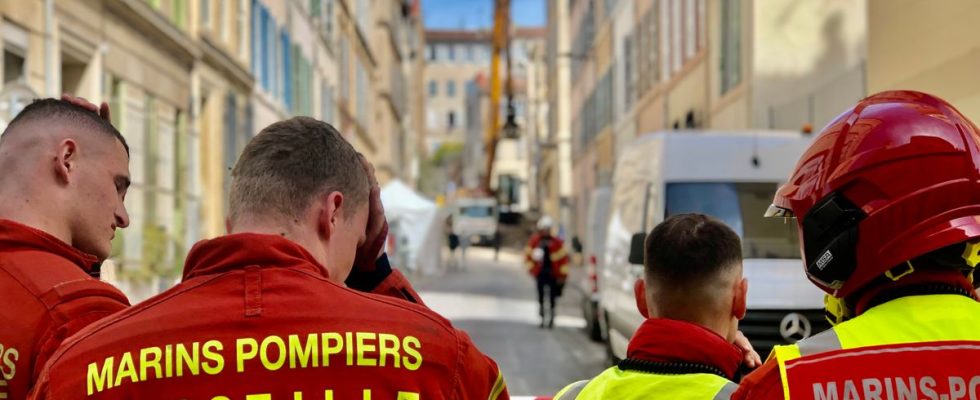The mechanical shovel is silent for a while. A construction truck drives off, carrying its chaotic load of cut stones, dust and scrap materials. Shovels and brooms in hand, Yann* and three other marine firefighters step over the safety perimeter tape before disappearing behind a sheet obscuring the clearing site at numbers 15, 17 and 19 rue de Tivoli. Nearly 72 hours after the collapse of buildings in Marseille, a hundred firefighters continue to be permanently mobilized night and day on the rubble.
With them, it is the hope, every hour dimmer, of a miracle that is maintained. Two of the eight bodies carried away by this disaster were, this Tuesday evening, still sought by the relief. A search and rescue operation, exceptional in its scale and duration, which transformed Boulevard Eugène Pierre into a mobile barracks. Dozens of fire engines of all types are parked along this closed two-way street.
“We have fun as we can”
Everywhere, firefighters are trying to rest, their intervention gear still laden with dust when they haven’t taken the time to take it off. Slumped on a bag, in the shade of a hackberry next to which a module containing rescue equipment has been placed, Patrick* scrolls through videos on Tik Tok helping him to think about something other than the drama in progress.
Further on, a barnum has been mounted between four planters where young bamboos grow and supporting two beams acting as a bench. A group of sailors-firefighters rests there, nibbling on a pastry, a chocolate bar, so many delicacies offered by the merchants of the district. Opposite, on the other side of the boulevard, two firefighters exchange a few smiles as they show each other their phones: “You might think we’re kidding, but we’re having fun as we can”, feels obliged to justify one of them. Arrived at eight o’clock in the morning, he will not leave until the next day at the same time. His colleague did the day on Sunday, was off Monday, before returning on Tuesday morning. “We know fatigue, we know how to do it, we are used to it”, sums up this forty-year-old with dark circles, impeccable uniform and freshly waxed rangers.
Firefighters organized as on a ship
These 24-hour guards “are the usual operation of the barracks of the 2,600 military professionals, marine firefighters of Marseille”, details the second in command, captain Christophe Guillemette. To make it possible to have one hundred firefighters permanently mobilized without losing pace, the teams are organized into shifts, like on a ship. “Rather in thirds,” corrects the captain. “The different teams, rescue, clearing, canine, support or medical, operate in six-hour work and rest cycles,” he continues. However, there is no question of spending six hours continuously on the rubble.
“We often leave for thirty minutes to an hour on site before coming back and leaving later”, specifies a sailor-firefighter returning from intervention. A rhythm which is however constantly adapted, according to the evolution of the situation: “When it was necessary to work under breathing apparatus (at the beginning of the operation when a violent fire was smoldering under the rubble), the periods of interventions were shorter”, shows the second in command.
Hand works
Now that the mechanical shovel only intervenes very occasionally to remove the heaviest debris or load the trucks with heaps already inspected and put aside, most of the work is done by hand and the times on site are necessarily lengthen. This is all the more so as the emergency services are more and more regularly forced to evacuate the mound of debris. As it decreases, the walls framing this gaping hole show signs of feverishness. Tuesday evening, more than 950 cubic meters of rubble had already been evacuated, while relief workers estimate that there are just over 500 left.
This deployment of forces makes it possible to play at the most sustained pace possible in this race against the clock, and despair brings in its wake a whole logistics. And, once again, as on a ship, the marine firefighters of Marseille are autonomous to carry out long-term operations. Teams are dedicated to refueling. The battalion canteen was relocated to the ground floor of the Roosevelt school, located at the top of the rue de Tivoli. On the first floor of the building, where children’s laughter usually resounds, camp beds have been set up. What to sleep a little and eat hot, if the heart is there, before leaving with a shovel in hand and hope pegged to the body. Operations are expected to last several more days.
* Not having the authorization to express themselves by their hierarchy, the testimonies are anonymous.

